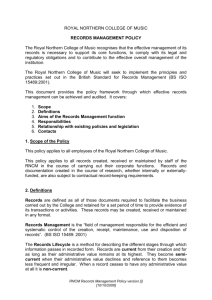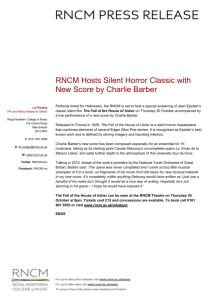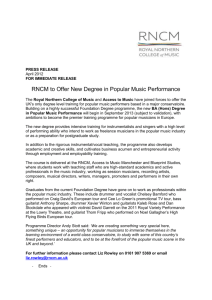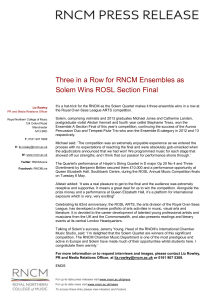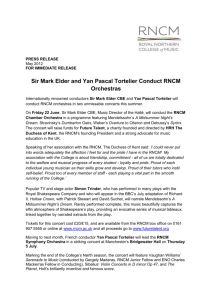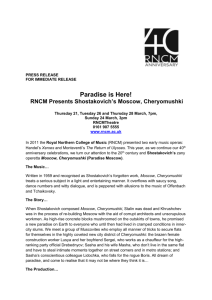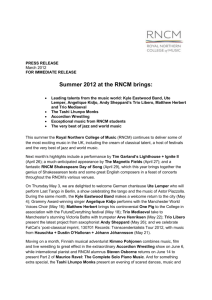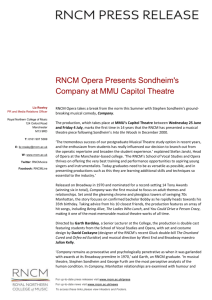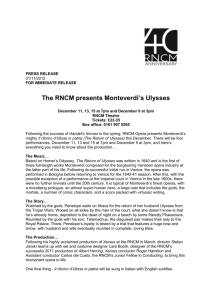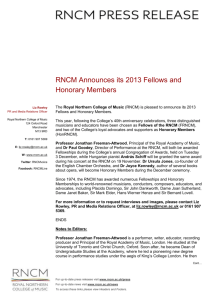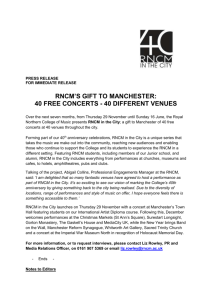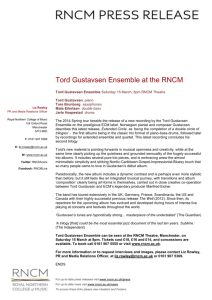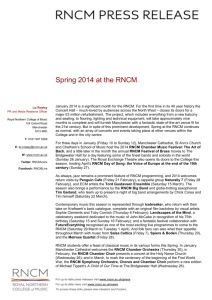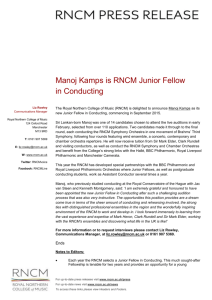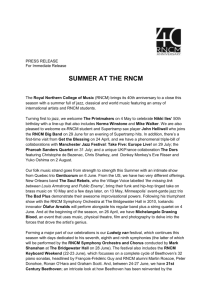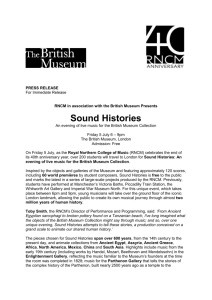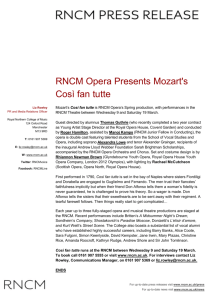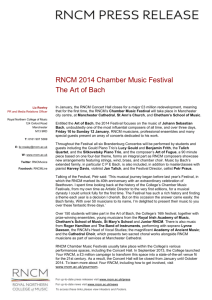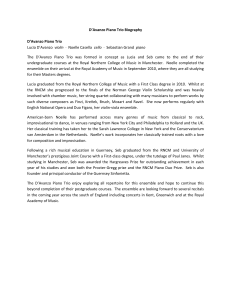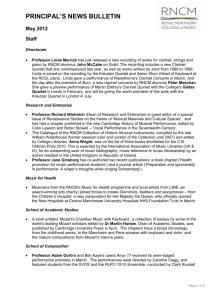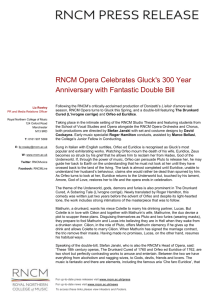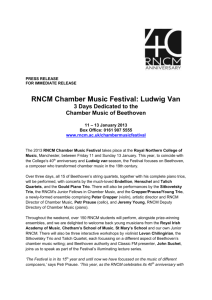Royal Northern College of Music Records Management Policy
advertisement
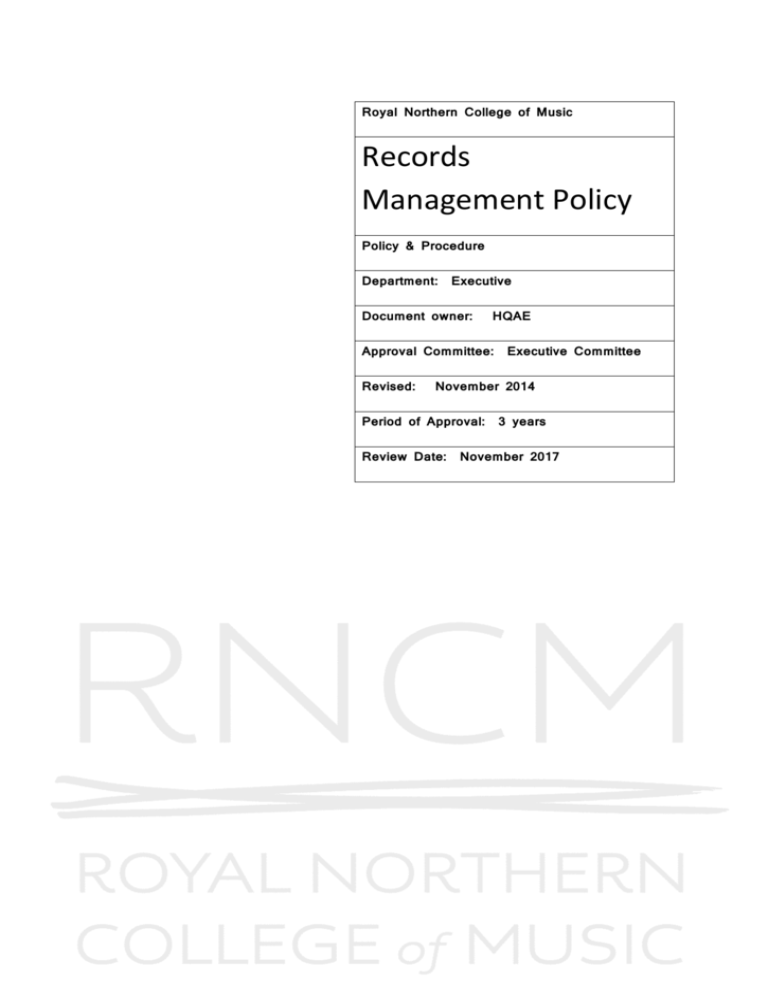
Royal Northern College of Music Records Management Policy Policy & Procedure Department: Executive Document owner: HQAE Approval Committee: Revised: Executive Committee November 2014 Period of Approval: Review Date: 3 years November 2017 1. PURPOSE The Royal Northern College of Music (RNCM) recognises that the effective management of its records is necessary to support its core functions, to comply with its legal and regulatory obligations and to contribute to the effective overall management of the College. College records are defined as those documents or data sets which arise from or facilitate the business carried out by the university and which provide evidence of its transactions or activities. 2. SCOPE This policy applies to all employees of the RNCM. This policy applies to all records created, received or maintained by staff of the RNCM in the course of carrying out their corporate functions. This policy applies to all contractors, suppliers, partners and external researchers who may be given access to College records. Records and documentation created in the course of research, whether internally or externally-funded, are also subject to contractual record-keeping requirements. 3. POLICY STATEMENT Records are an important asset to the College and they require appropriate management for effective and efficient administration, for the discharge of College business and for compliance with legislative requirements. Good management of records also helps organise records appropriately, removes out of date or superseded records and reduces duplication of documents and data. It is the intention of this policy to ensure that records of vital importance for the continuing operations of the RNCM are identified and managed systematically. Namely: That the College’s non-current records should be stored in an organised, efficient and, where necessary, confidential way. That the College will monitor and offer advice on the creation, maintenance, version control and disposition of records throughout the College. That the College will ensure compliance with legislation relevant to the creation and processing of records such as the Data Protection Act 1998, Freedom of Information Act 2000 and the Environmental Information Regulations 2004. That the College will facilitate the identification and selection of material suitable for permanent preservation in the College Archives. Records may be created, received or maintained in any format. The records lifecycle is a method for describing the different stages through which information passes in recorded form. Records are current from their creation and for as long as their administrative value remains at its highest. They become semi-current when their administrative value declines and reference to them becomes less frequent and irregular. When a record ceases to have any administrative value at all it is non-current. Vital records are those without which the College would cease to be able to function properly. All other records are non-vital. A Retention Schedule is a list of record series (types of records) setting out the periods/actions describing their preservation/destruction. 4. RESPONSIBILITIES 4.1 Heads of School/Department Heads of schools and departments have overall responsibility for the management of records generated by their school/department’s activities, thus ensuring that the records created, received and controlled within their department or unit, and the systems (electronic or otherwise) and procedures they adopt, are managed in a way which meets the aims of the College’s record management policies. 4.2 Committee Secretaries Committee Secretaries are responsible for ensuring that a full record of a committee’s business (its minutes, agenda and all supporting papers and reports – regardless of their format/medium of origin) is preserved and that any documents generated or received electronically are printed in hard copy format and form part of the full and official record. This official record, in paper format and designated for permanent retention in the College Archive, will be taken as the definitive and authentic copy. Copies of minutes, reports and papers may then be distributed and also shared electronically. Such copies will be the personal responsibility of individual committee members, to be confidentially destroyed routinely and must not be passed on for archiving. 4.3 Staff Individual employees must ensure that records for which they are responsible are a complete and accurate record of activities, which are maintained and disposed of in accordance with the College records management guidelines. 5. RELATED DOCUMENTS This policy has been formulated within the context of College policies and guidelines, national legislation and professional standards. This policy establishes a framework for guidance on the procedures necessary to comply with the policy. Retention Schedule Data Protection Policy Freedom of Information Policy Email Protocol Guide to the Management of Electronic Records 6. CONTACT Head of Quality Assurance and Enhancement Royal Northern College of Music 124 Oxford Road Manchester M13 9RD T: 0161 907 5200 E: enquiries@rncm.ac.uk
